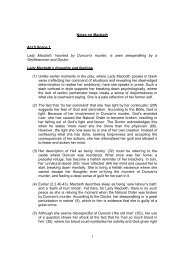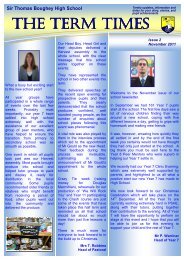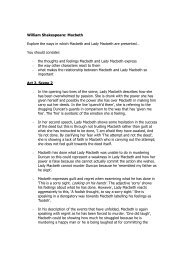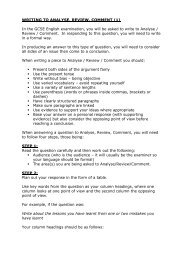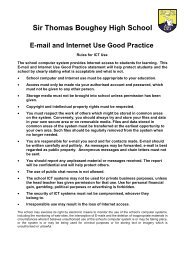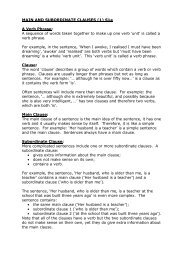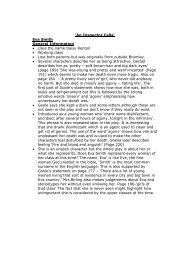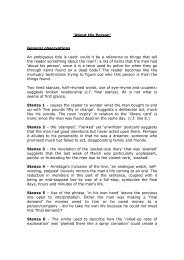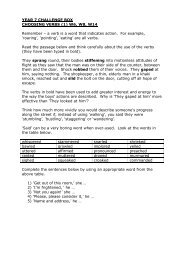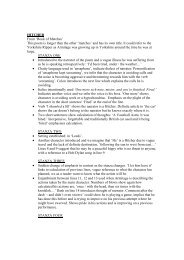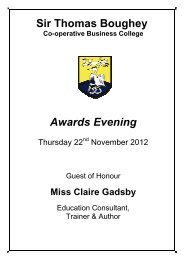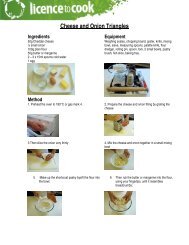Macbeth Act 3 Scene 4 Notes - Sir Thomas Boughey High School
Macbeth Act 3 Scene 4 Notes - Sir Thomas Boughey High School
Macbeth Act 3 Scene 4 Notes - Sir Thomas Boughey High School
Create successful ePaper yourself
Turn your PDF publications into a flip-book with our unique Google optimized e-Paper software.
Shows togetherness with wife – use of<br />
‘We’<br />
‘Come, we’ll to sleep’<br />
‘We are yet but young in deed.’<br />
‘You look but on a stool.’<br />
Tries to reassure her husband<br />
‘My worthy lord’<br />
Shows her strength in the relationship<br />
by telling off her husband.<br />
‘You have displaced the mirth, broke<br />
the good meeting, with most admired<br />
disorder’<br />
<strong>Act</strong> 3 sc 4<br />
Enter <strong>Macbeth</strong>, Lady <strong>Macbeth</strong>, Ross, Lennox, Lords, and Attendants:<br />
The first stage direction, "A banquet prepared " (3.4.1, s.d.), is important. To prepare a<br />
banquet, servants would bring in tables, stools, dishes, cutlery, cups, food, and drink.<br />
This hustle and bustle makes it seem like a good time is going to be had by all. <strong>Macbeth</strong><br />
certainly seems in the mood. He welcomes everyone at once, saying, "You know your<br />
own degrees; sit down. At first / And last the hearty welcome" (3.4.1-2). The "degrees"<br />
of the guests are their social ranks. Normally, each guest would receive an individual<br />
greeting and then be escorted to his seat, with the highest ranking person sitting closest<br />
to the king, and the next highest the next closest, etc. <strong>Macbeth</strong> tells them that they know<br />
where they should sit, and welcomes everyone at once. He will "play the humble host"<br />
(3.4.4), showing how friendly and down-to-earth he is, even though he is now the king.<br />
First Murderer appears at the door:<br />
Just as <strong>Macbeth</strong> is taking his place among all of his loving subjects, he sees First<br />
Murderer come to the door with blood on his face. Not wanting anyone else to see the<br />
bloody man, <strong>Macbeth</strong> jumps up and hurries to the door. As he goes, he tells his guests<br />
that in a minute "we'll drink a measure / The table round" (3.4.11-12).<br />
<strong>Macbeth</strong> whispers with the murderer at the door. (Of course we can hear what they say,<br />
but <strong>Macbeth</strong>'s guests can't.) First Murderer says that the blood on his face is Banquo's.<br />
In reply, <strong>Macbeth</strong> makes a cruel joke, saying that it's better for the blood to be on the<br />
outside of the murderer than on the inside of Banquo: "'Tis better thee without than he<br />
within" (3.4.14). Despite his disappointment that Fleance escaped with his life, there's<br />
nothing more to be done in this matter, so <strong>Macbeth</strong> tells First Murderer to leave. Just at<br />
this moment Lady <strong>Macbeth</strong> comes with some advice for her husband. She is afraid that<br />
<strong>Macbeth</strong>'s behaviour — standing at the door and apparently saying nothing — will<br />
make the guests feel unwelcome. She tells him, "The feast is sold / That is not often<br />
vouch'd, while 'tis a-making, / 'Tis given with welcome" (3.4.32-34). She means that a<br />
host makes his guests feel welcome by often inviting them to eat and drink freely. If a<br />
feast is not thus "vouch'd," it's no better than a meal that is "sold" at an inn. She goes on<br />
to say that if a person just wants to eat, the best place to do that is at home. Away from



